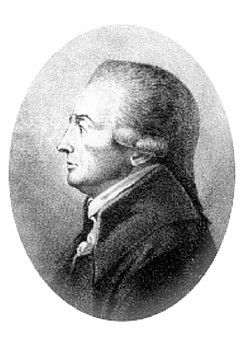|
- - - -
Solomon Maimon
MAIMON Salomon
(1753 – 22.11.1800)
Self-taught philosopher; follower and critic of Immanuel Kant, founder of monistic idealism
Salomon Maimon was born in a village Zhukov-Borok, Stolbtsy district, Minsk region. He finished Jewish school in a settlement Mir, Stolbtsy district, and then Talmudic school in a settlement Ivianiec, Volozhin District. He was already married in 1764, became a farther in 1767; Maimon provided a family by working as a tutor. Having learned the German language by himself, in 1776 he walked to Berlin (Germany) to study medicine and then work as a doctor. Maimon led a nomadic life in Germany, Poland, Holland. In 1777–1780 he worked as a tutor in Poznan (Poland). In 1780–1783 he studied pharmaceutical art and continued his self-education. In 1783–1785 Salomon Maimon studied mathematics, Latin, Greek, English and French in the Gymnasium Christianeum in Altona (now it’s within the bounds of the city Hamburg). He worked as a teacher in Wroclaw (Poland) where in 1786 he wrote a textbook on Newtonian physics. Maimon returned to Berlin in 1787. He didn’t acquire any profession which permitted to earn his living; he strove for a quiet life full of philosophical thoughts. His critical remarks and uncompromising opinions alienated former patrons. In 1790s Count Alexander Kalckreuth was Maimon’s patron, where in the estate Niderzigersdorf, Lower Silesia (now Poland), Maimon spent the last years of his life. Salomon Maimon was a supporter of the philosophy of medieval theologist and physician M. Maimonides (1135–1204), in 1770 he wrote a commentary on his work “Guide for the Perplexed”, giving it rationalistic interpretation. Through the philosophy of Maimonides, out of respect for whom he changed his name to Maimon, he came to Aristotelianism, and the work “Aristotle’s Categories” (1794) was the result of it. He didn’t develop his own system of philosophy, he acquired a reputation of a critical philosopher thanks to his subtle and critical analysis of philosophical works, especially the philosophy of Immanuel Kant; he acquainted with his works in Berlin. It was not until 1788 when he made comments on Kant’s “Critique of Pure Reason”; on the basis of Kant’s work he published in German his first philosophical work “The experience of transcendental philosophy with the application of symbolic cognition” (1790). Salomon Maimon criticized the philosophy of Kant and the interpretation of his teaching by the neo-Kantians, in particular the notion “things-in-themselves”, which he described as the manifestation of metaphysical dogmatism. While analyzing Kant’s philosophy he emphasized that the capacity for critical knowledge depended only on the properties of the knowing subject, and he thought that there was only non-essential difference between the possibility of cognition through sense and through mind. Maimon’s concept of thinking had a great influence on German idealist philosophy. It’s believed that he prepared the very understanding of Kant that later was developed by the Neo-Kantians. Maimon’s amazing philosophical abilities attracted attention of M. Mendelssohn, J. W. Goethe, J. Schiller, J. G. Fichte, and others. Salomon Maimon also wrote “The Importance of Bacon Verulam and Kant to Modern Philosophy”, “About the World Soul”, “Experience of New Logic or Theory of Mind”, “Essays on the History of Philosophy”, etc. In 1797 he published the most substantial essay “Critical study of the human mind, or Higher Ability of Cognition and Volition”, which he devoted to Count A. Kalckreuth. In 1791 Maimon published in German his autobiography which was compared with “Confessions” of Jean-Jacques Rousseau. He died in Nidergersdorf and was buried in Glogau (Poland).
Works:
1. Versuch uber Transcendentalphilosophie: mit einem Anhang uber die symbolische Erkenntniss und Anmerkungen. Berlin: Christian Friedrich Vo? und Sohn, 1790.
2. Salomon Maimon’s Lebensgeschichte. Von ihm selbst geschrieben und herausgegeben von K. P. Moritz. In zwei Theilen. Berlin: Friedrich Vieweg, 1792–1793.
3. Versuch einer neuen Logik oder Theorie des Denkens. Nebst angehangten Briefen des Philaletes an Anesidemus. Berlin: Ernst Felisch, 1794.
4. Die Kategorien des Aristoteles. Mit Anmerkungen erlautert und als Propadeutik zu einer neuen Theorie des Denkens. Berlin: Ernst Felisch, 1794.
5. Kritische Untersuchungen uber den menschlichen Geist oder das hohere Erkenntni?- und Willensvermogen. Leipzig: Gerhard Fleischer, 1797.
6. Gesammelte Werke. Ed. by Valerio Verra. In 7 vols. Hildsheim: Olms Verlag, 1965–1976.
7. The Autobiography of Solomon Maimon. Urbana and Chicago: University of Illinois Press, 2001.
Literature:
1. Atlas S. From Critical to Speculative Idealism: The Philosophy of Solomon Maimon. The Hague: Martinus Nijhoff, 1964.
2. Bergman S. Н. The Philosophy of Solomon Maimon. Jerusalem: Magnes Press, 1967.
3. Kozlowski R. Salomon Maimon jako krytyk i kontynuator filozofii Kanta. Poznan, 1969.
4. Moiso F. La filosofia di Salomone Maimon. Milan, 1972.
5. Buzaglo M. Solomon Maimon: Monism, Skepticism and Mathematics. Pittsburgh: Pittsburgh University Press, 2002.

© National Academy of Sciences of Belarus, 2011
|
|


